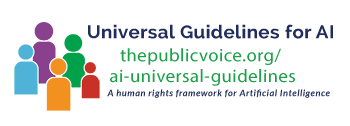The EPIC AI Policy Sourcebook is the first reference book on AI policy.
 The EPIC AI Policy Sourcebook is the first compendium of AI policy, providing essential information to policy makers, researchers, journalists ,and the public. The EPIC Sourcebook includes global AI frameworks such as the OECD AI Principles and the Universal Guidelines for AI. The Sourcebook also includes AI materials from the European Union and the Council of Europe, national AI initiatives, as well as recommendations from professional societies, including the ACM and the IEEE. The Sourcebook also includes an extensive resources section on AI, including reports, articles, and books from around the world.
The EPIC AI Policy Sourcebook is the first compendium of AI policy, providing essential information to policy makers, researchers, journalists ,and the public. The EPIC Sourcebook includes global AI frameworks such as the OECD AI Principles and the Universal Guidelines for AI. The Sourcebook also includes AI materials from the European Union and the Council of Europe, national AI initiatives, as well as recommendations from professional societies, including the ACM and the IEEE. The Sourcebook also includes an extensive resources section on AI, including reports, articles, and books from around the world.
From the Introduction:

Marc RotenbergMore broadly, we can begin to see two different scenarios for the AI future. In one, AI augments the work of people, provides new insight into social and economic problems, and offers new solutions that we may choose to adopt based on our own judgement. Fundamental rights, the rule of law, and democratic institutions are secure. In this human-centric view, AI is one of many tools available to society, one of many techniques that enables human progress. But there is also an alternative scenario in which AI displaces the work of people, embeds current social and economic problems, and conceals outcomes in layers of complexity and opacity that humans simply come to accept. The structures that maintain free and open societies begin to diminish. There are clearly important policy choices ahead."
President, EPIC
Praise for the EPIC AI Sourcebook:

Harry LewisAn invaluable assembly of varied governmental, professional, and corporate documents on the development and use of AI, from founding principles to the latest detailed international guidelines.”
Gordon McKay Professor of Computer Science, Harvard University

Sherry TurkleAI is now a priority in policy. National, international, and professional organizations are proposing frameworks for how to think things through. This volume brings their proposals together, and thus is an essential document. It also alerts us to a significant danger. Our desire for transparency and fairness in AI policy will not come without vigilance. AI can concretize social and economic problems in code. And as Marc Rotenberg suggests in his excellent introduction, it may thus “conceal outcomes in layers of complexity and opacity that humans simply come to accept.” Required reading for a necessary conversation.”
Abby Rockefeller Mauzé Professor of the Social Studies of Science and Technology, MIT

Professor Frank PasqualeThe EPIC AI Reference Book is a focused, thoughtfully curated collection of leading governmental, corporate, and academic approaches to AI ethics, law, and policy. It should appeal to both long-standing participants in the field, and to those seeking bearings in increasingly complex debates over the future roles of computation and algorithms in our daily lives.”
Author, The Black Box Society: The Secret Algorithms That Control Money and Information

Steve LohrThe EPIC AI Sourcebook is a real contribution to public policy. The overview provides a succinct summary of key issues, and the collection of principles and declarations, including Asimov’s Three Laws of Robotics, is comprehensive.”
Author, Data-ism: The Revolution Transforming Decision Making, Consumer Behavior, and Almost Everything Else

Paul Nemitz#Mustread: @EPICprivacy - #AI Policy Sourcebook 2019. Superb! @MarcRotenberg did it again. It shows: A lot of interesting prose. No binding law. And: The more valuable the corporation, the less meaningfull the so called #AI #Ethics texts.”
Principal Adviser on Justice Policy, EU Commission
Includes:
- OECD Principles on AI (2019)
- European Commission High Level Expert Group on AI, Ethics Guidelines for Trustworthy AI (2019)
- White House, Executive Order 13859, Maintaining American Leadership in AI (2019)
- Canada-France Statement on Artificial Intelligence (2018)
- Public Voice, Universal Guidelines for AI (2018)
- Isaac Asimov, Three Laws of Robotics (1942)











